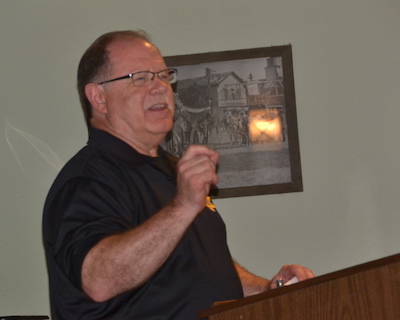To allow marijuana dispensaries or not? Orleans towns, villages have until Dec. 31 to decide
Municipalities can’t ban marijuana after legalization by state; Sheriff worries about impaired drivers

Photo by Tom Rivers: Orleans County Sheriff Chris Bourke said law enforcement agencies will adapt to the new state legislation for legalizing recreational use of marijuana, but he is concerned there will be more impaired drivers on the road.
ALBION – Orleans County municipalities have until Dec. 31 to decide whether they will opt out of allowing marijuana dispensaries, where people could purchase adult-use cannabis products.
The municipalities also need to decide by the end of the year if they will opt out of allowing onsite consumption at businesses such as a smoking lounge.
The towns and villages can’t overstep the state and ban recreational use of marijuana. But the towns and villages can prohibit dispensaries and smoking lounges.
It’s not an issue for the county government, but instead for the towns and villages, said Lynne Johnson, County Legislature chairwoman.
“It’s not a county-regulated issue,” Johnson said. “It’s a town and village one.”
She spoke with other local government leaders in the county during a monthly meeting last week for the Orleans County Association of Municipalities.
The state has approved a 13-percent excise tax on marijuana with a breakdown that includes 9 cents for each taxable sale to the state, 3 cents to the municipality that has the dispensary, and 1 cent to the county.
“I don’t believe the monetary gain with sales tax will counteract the negative effect in the long run,” Johnson said.
Municipalities that opt out wouldn’t be eligible for the 3-cent share of the 13-percent sales tax. The municipalities could also adopt zoning and limit the locations for dispensaries, including establishing certain distances from schools, churches and other houses of worship.
If the municipal board for a village or town decides to opt out, residents could push a permissive referendum, with the matter going on the ballot.
“It comes down to what your community wants,” said John Belson, the Lyndonville mayor.
Municipalities could decide to opt out, and later decide to “opt in” and allow the dispensaries and lounges, said John Sansone, municipal attorney for Holley, Murray and Clarendon.
If the municipalities don’t vote to opt out, then they are “opting in” and that doesn’t require a vote to allow dispensaries and the smoking lounges.
Sansone is also an assistant county district attorney, and that office led by Joe Cardone is concerned about public safety with recreational marijuana being legalized.
“It presents challenges,” Sansone said to the local officials.
Sheriff Chris Bourke said law enforcement may not easily be able to determine if a driver is “impaired” by marijuana. There isn’t a Breathalyzer machine to determine a level of impairment or the amount of marijuana in the system.
The local law enforcement agencies can have officers and deputies trained as drug recognition experts but that is a costly and time-consuming training, Bourke said.
“Our concern is how many more impaired drivers will we have on the road?” Bourke said. “We think quite a bit and are we prepared for that?”
Bourke said officers and deputies trained as drug recognition experts “are few and far between.”
The local government leaders also will need to look at employee policies for whether marijuana can be used during breaks, how to respond if employees come to work with a level of impairment, and whether the marijuana products will be banned for use on municipal grounds.
Bourke said he wants a “zero tolerance” policy for employees of the Sheriff’s Department. He said the workers face too many critical issues and need to be 100 percent.
“I don’t think a 911 dispatcher who has been smoking marijuana all day should come to work and handle 911 calls,” Bourke said.
Sansone said he isn’t sure whether municipalities could have a zero tolerance policy for a product that is now legal in the state.
That could depend on what jobs the workers have. A motor equipment operator, for example, may be subject to a no tolerance for marijuana while working.
“All town attorneys are likely working on this,” Sansone said. “It’s an issue that will likely be determined by lawsuits.”
Sansone said municipal leaders will also face the issue of how to determine impairment among the workers. Bourke said a simple “smell test” may be enough. He doesn’t want employees who smell of marijuana.
“If you are serving the public and reek of marijuana that is unprofessional and will be forbidden by the Orleans County Sheriff’s Office,” he said.

































































